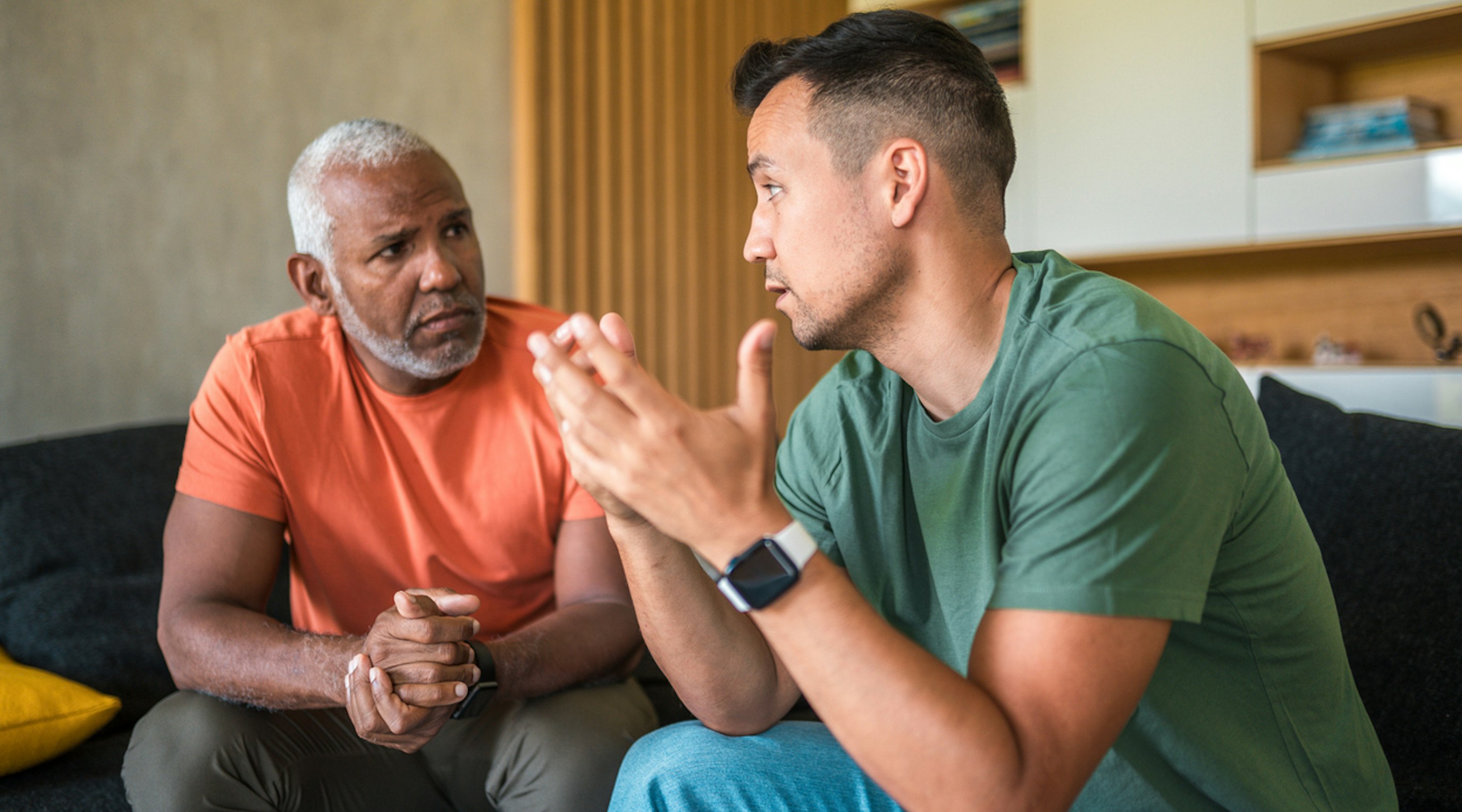Let’s talk testosterone: Hormonal health and the potential role of medical cannabis
10 min read
Sam North
For most men, testosterone levels start to decline in our mid 30s. The result isn't always overly noticeable at first, but as testosterone starts to slip into the lower end of normal range, you might start feeling a little more tired, low, or just not quite yourself. Medical cannabis won't replace hormones, but it may help ease symptoms like fatigue, poor sleep, low mood, and libido shifts.
Contents
They say change is inevitable, that it’s the only constant, that it builds character. All true, but when the change you're facing is all low energy, poor sleep, lost libido, or a some unexpected unease you find hard to shake, it can be a bit of a tough pill to swallow.
For some men, this can be tied to testosterone gradually starting a downward spiral, usually between the ages of 30 to 35., and beyond
While there is no concrete evidence showing that medical cannabis can help boost flagging testosterone levels (although there are some intriguing emerging studies which we will unpack further down), it does have the potential to help ease the symptoms that often crop up as hormones begin to shift.
A legal UK medical cannabis prescription may offer a supportive path towards regaining a better life and more balance.
What is testosterone, and why does it matter?
Testosterone isn’t just about building up biceps or libido, though it certainly plays a part in both.
It’s a key androgen hormone that shapes everything from how your body holds strength to how your brain handles stress. It supports bone density, red blood cell production, fat distribution, and even your ability to focus and feel present.
When it’s in balance (as it probably has been for most of your life), most of us simply don’t think about it. Maybe a brief mention of it from your GP during a yearly physical, or a ‘clickbaity’ thumbnail for a male-targeted wellness/fitness podcast. But when testosterone levels start to dip (and dip they will), the effects sometimes show up in ways that can be a little hard to pin down.
Not dramatic. Just… off.
You might find yourself slower to recover after exercise. A bit more withdrawn. Less interested in the things that used to fire you up. Low mood lingers for longer than it used to. Nothing’s broken, exactly, but things feel different.
What happens to testosterone levels as we age?
Like it or not, testosterone begins its slow retreat somewhere around the age of 30 to 35 (for most men, not all though). On average, levels drop by about 1% to 2% each year. That is slow enough that it isn’t particularly noticeable for the first 5 to 10 years, but steady enough to make a difference over time.
Not all men feel it the same way. Some men move through midlife without much trouble, or much of a drop in testosterone until much later in life.
That said, most of us will face the mid-30s testosterone drop, along with potentially facing a list of symptoms - fatigue, low mood, brain fog, and/or a drop in sexual interest. And when symptoms do appear, they’re often brushed off as job or life-related stress, poor sleep, or just “getting older.”
Testosterone replacement therapy (TRT) hit the big time about a decade ago and is one medical route that can be effective for certain patients. But it’s not the only option, nor is it right for everyone.
Other, somewhat less often discussed, approaches focus on easing the symptoms rather than synthetically replacing the hormone itself. Lifestyle shifts, better sleep, stress management, and (in some cases) complementary treatment options like medical cannabis can all play a role in helping men get back to their best.
Can medical cannabis help? Symptom management, not hormone replacement
Let’s start with the obvious disclaimer: there simply isn't enough solid evidence to make any claims that medical cannabis increases testosterone. No miracle fix, no hormonal shortcut. The relationship between cannabis and endocrine function is incredibly intricate and is still being studied. Right now, the research just isn’t there to support a direct link.
That said, there is one recent study that did focus on just this, while also tackling a common myth (you know, the one on how long-term cannabis usage decreases testosterone levels...)
Titled “Marijuana use and serum testosterone concentrations among U.S. males”, this study from 2018 found no significant difference in testosterone levels between men who had ever used marijuana and those who hadn’t. Interestingly, men who had used cannabis more recently showed slightly higher testosterone levels, especially in the 18 to 29 age group.
This effect was linked to recency, not dose or duration, and the differences weren’t strong enough to draw firm conclusions. For now, this remains an open question, but one that we will hopefully have more answers to very soon.
What we do have, though, is a growing body of clinical evidence and real-world patient reports suggesting that cannabis may help with the symptoms that often come with hormonal decline.
Does medical cannabis really reduce fatigue?
The old split between Indica vs Sativa weed strains gets brought up a lot in conversations about energy, especially in the recreational cannabis market. Although many now believe this out-and-out classification is now null and void, Sativa cultivars have traditionally been seen as the go-to daytime pick-me-up, while Indica strains are commonly associated with slower evenings in front of the telly.
But this binary classification is, at best, a very rough guide. It’s rooted as much in marketing as in science, and often ignores the more meaningful factors: cannabinoid content, terpene profile, and individual response.
There is both anecdotal and early clinical evidence suggesting that certain medical cannabis cultivars can help counter fatigue. Some options can help boost alertness or mental clarity, particularly those with balanced THC to CBD or lower-THC profiles combined with energising terpenes like limonene or pinene.
Can medical cannabis help with anxiety, depression, and general mood?
Hormonal changes don’t just affect how the body functions, but also shape how we feel, respond, and relate to the world around us. For some men, a dip in testosterone shows up emotionally first. Heavier levels of anxiety than usual, a low rumble of depression that lingers for days or weeks, or just a general dulling of interest in things that used to be fun.
Medical cannabis options have shown clear antianxiety potential in both clinical research and patient reports.
Take Ben as an example.
A 37-year-old Releaf patient, Ben spent nearly two decades managing anxiety and depression with SSRIs and opioids, until he turned to medical cannabis in search of a more natural alternative.
He’s now tapering off his antidepressants, with support from his GP and the Releaf clinical team. And for the first time in years, he said he’s feeling like himself again:
"It’s early days, but I’m certainly feeling calmer, generally happier. My thoughts are more easily managed. I’m sleeping better and waking up less. There’s just less chaos in my head at night, which is such a relief because that used to be the worst time. Usually, when the lights go off, and there’s no distraction, my thoughts spiral.”
“But now, going to sleep is a bit more chilled. It’s not like I’m stoned - it’s just that I’m finally able to relax. I'm certainly feeling calmer, generally happier. My thoughts are more easily managed. I honestly believe the treatment is doing exactly what the doctors said it would."
Cannabis isn’t a quick fix for mood changes caused by hormone shifts. But for men like Ben, it can offer the kind of steady, manageable support that makes daily life feel more grounded, and a little less like hard work.
But we must stress that finding the right formulation matters, which is why clinical oversight is paramount. High-THC products, especially without balancing cannabinoids or terpenes, can sometimes make anxiety worse for certain patients.
That said, when the prescribing process is carefully considered and individualised, and comes with ongoing clinical guidance and support, medical cannabis may offer enough relief to help steady the ground beneath your feet. Sometimes, that’s the difference between just getting through the day and truly enjoying it.
Can medical cannabis help with low libido?
Libido isn’t purely governed by hormone levels (although testosterone does play a pretty major role). It’s also shaped by how much sleep we are getting, our general mood, how stressful the day or week has been, our self-image, the quality of our relationships - the list goes on.
Sometimes a drop in libido is subtle, sometimes not. Either way, it can be hard for men to talk openly discuss, and work on.
Again, the key here is context and dosing.
Medical cannabis won’t “fix” low libido rooted in hormone levels. But by helping improve sleep, reduce stress, and quiet the mind, it can help create the conditions where intimacy feels more possible, and less pressured.
For some, it may be all that’s needed to shift things in the right direction.
Final word: Testosterone matters - but you’re not alone in this
Have you just started to realise that “wow, I guess I am actually middle-aged”?
Feeling tired all the time?
Not quite yourself?
It’s easy to chalk it up to stress, age, or the general blur of life. But it’s worth pausing to ask why. Testosterone may not be the whole story, but if you are a man over the age of 35, it’s often part of it.
Hold your horses, we’re not saying you need to jump headfirst into hormone therapy. Steady, sustainable lifestyle shifts may be all you need right now, but for some, a little medical cannabis may also help.
Better sleep, regular exercise, stretching, a few minutes of meditation, eating a healthy, balanced diet, and cutting back on alcohol can all help recalibrate the system. Medical cannabis and TRT may also support that process, particularly when fatigue, low mood, or poor sleep are getting in the way.
So have the conversation with your GP and see what they have to say.
If you’re curious about whether cannabis can have a place in your plan, our medical cannabis eligibility checker is the best place to begin. It takes just 20 seconds to answer the three questions, and you’ll get an instant answer on whether you may qualify for a UK medical cannabis prescription with Releaf.
Releaf - Let's Rethink Healthcare
Share article
Did you like this article?
It is important to seek medical advice before starting any new treatments. The patient advisors at Releaf are available to provide expert advice and support. Alternatively, click here to book a consultation with one of our specialist doctors.
Elevate your wellness with medical cannabis
Get comprehensive care, convenience, and confidence with an all-in-one treatment plan.
Am I eligible?Authors
Sam North, a seasoned writer with over five years' experience and expertise in medicinal cannabis, brings clarity to complex concepts, focusing on education and informed use.
Editorial Policy
All of our articles are written by medical cannabis experts, guided by strict sourcing guidelines, and reference peer-reviewed studies and credible academic research. Our expert clinical team and compliance specialists provide valuable insights to ensure accuracy when required. Learn more in our editorial policy.
Need more help?











